An apron front farmhouse sink has an intrinsic design that is loved for its aesthetic appeal and ergonomic function. Additionally, it offers a few physical advantages not often found in a standard kitchen sink. Hence, farmhouse sinks become a go-to option in kitchen layouts, says Native Trails while pinning down the history of farmhouse sinks.
While offering physical advantages, a farmhouse sink does suffer from everyday wear and tear, meaning -it can get stains, scratches, and unattractive gunk which damages the sink and glossy sink surface.
Are you struggling to eliminate these damage-causing problems from your farmhouse sinks? Not anymore! We have compiled some of the many best methods for cleaning a farmhouse sink.
According to Kitchen Remodel Guides, the cost of repairing a farmhouse sink begins at around $75 goes up to $500. However, the price of the sink itself is high, and therefore, hiring a professional to fix your farmhouse sinks will only be -more costly.
Fortunately, there are DIY or home remedies to repair a farmhouse sink.
What Is a Farmhouse Sink?
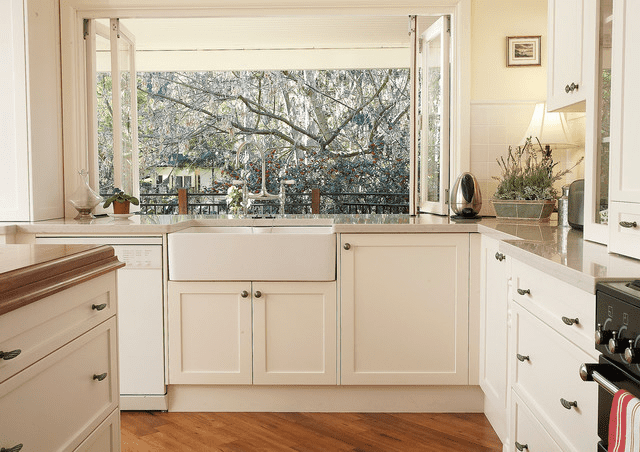
A renowned sink manufacturer says that the best part of farmhouse sinks is that it makes food prep and cleaning comfortable because you stand directly in front of the sink without any cabinets or countertops restricting your movements.
A farmhouse sink can be defined as a sink that showcases an exposing front or apron. Moreover, the exposed apron becomes the front for the sink and the countertop. You can also notice that farmhouse-style sinks have a large, deep bowl which is probably deeper than the top mount or undermount sinks creating a seamless yet trendy look.
For this reason, people often wish to get a farmhouse kitchen sink, but looking at the cost, they seem to go for a drop-in or undermount style sink. The cost of the sink depends upon the sink materials –stainless steel, cast iron, copper, porcelain, and fireclay.
Most importantly, one should know that they cannot be readily installed later -for doing so, one would need changing cabinets and plumbing as this type of sink rest lower than usual. It is always better to install the farmhouse sink during construction.
To understand the front farmhouse sink, let us look at its pros and cons.
ADVANTAGE
Provides enough room
The depth and width of farmhouse sinks make enough room for soaking dishes, pots, pans, grill gates, and even baking sheets.
Appearance
Farmhouse sinks are large, traditional, yet functional sinks. A farmhouse sink in any material offers elegance and beauty.
DRAWBACK
Need extra space
The installation of farmhouse sinks eats up a lot of countertop space. Hence, not suitable for a small and cozy kitchen.
Expensive
The cost of the farmhouse sink is, by far, a setback. It is relatively high-priced. The price generally depends upon the sink material, installation, etc.
Ways to Clean a Farmhouse Sinks
Besides being easy to clean, farmhouse sinks also show stains, scratches, dents, and unattractive deposits. Fortunately, we have some homemade and commercial methods to help you remove the dirt and restore your sink as new as ever.
Material-Specific Cleaning Methods
Farmhouse Sinks Are Available in No. of Materials. that Is the Reason We Need Different Methods to Clean These Materials. and Therefore, Let’s Dive Into the Cleaning Methods for Specific Materials.
Porcelain Farmhouse Sinks
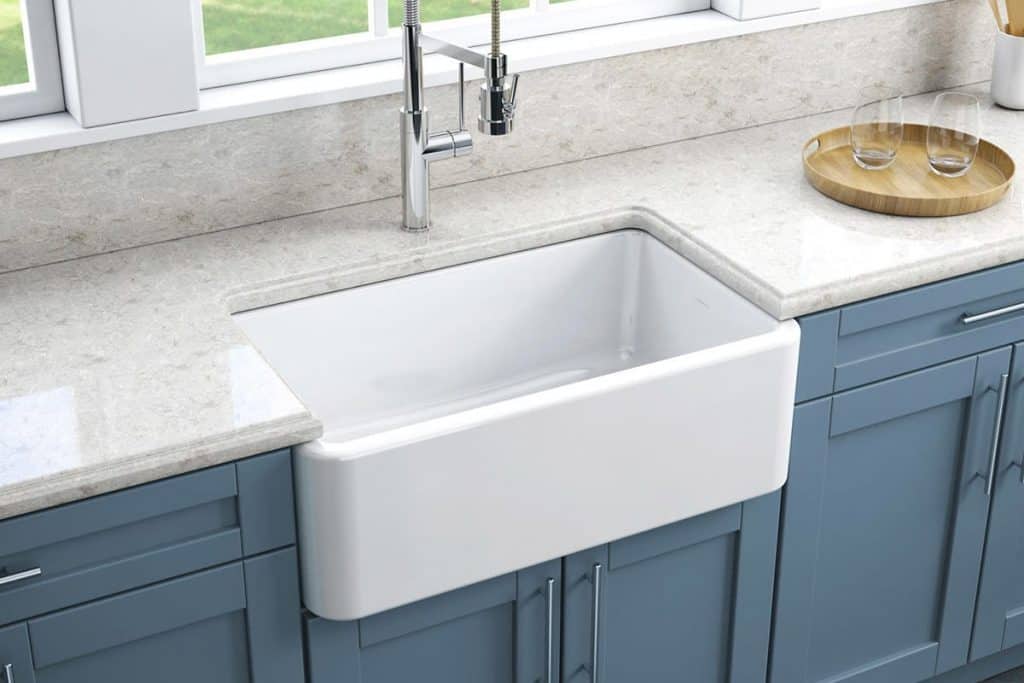
Traditionally, Porcelain Is Used for Making Farmhouse Sinks. Hence, Since the Old Times, Porcelain Farmhouse Sinks Seem to Be Quite Popular in Many Households for Their White, Glossy Finish.
Even though porcelain sinks are likely to be scratched, chipped, or cracked, the sink’s surface remains stain-free. Homemade solutions help clean stains, scratches, and hard water deposits from a porcelain farmhouse sink within no time.
Using Baking Soda and Vinegar
One of the best methods to get rid of the buildup, food stains, and liquid stains.
For this method,
- Drizzle the baking soda thoroughly over the stains (you can also apply it all over the sink).
- Simultaneously, pour some white vinegar into a spray bottle.
- Spray white vinegar entirely over the baking soda.
- Using a soft cloth or sponge, gently buff all the stains.
- Rinse the sink with water after it has rested for 5 minutes.
- Make sure you remove the vinegar thoroughly from the sink surface.
The cleaning methods for porcelain also apply to cast iron farmhouse sinks as it is enameled cast iron.
Note -Consider using white vinegar or apple cider vinegar and not concentrated vinegar as it can damage the porcelain surface.
Bonus Read: How to clean a porcelain sink?
Fireclay Farmhouse Sinks
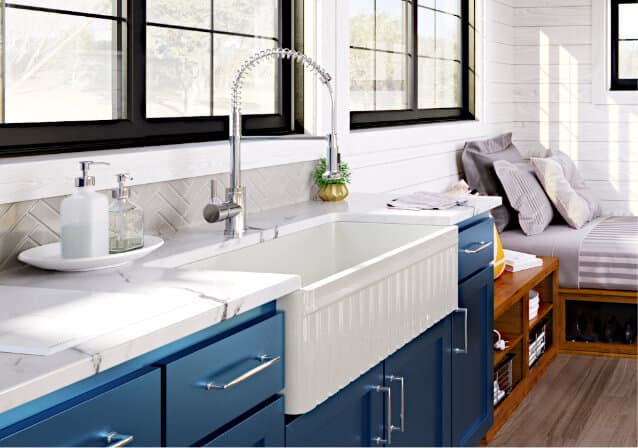
Another traditional material used to make farmhouse sinks is fireclay. Fireclay is a durable yet strong material to use for making a sink. Fireclay farmhouse sinks are famous for their alluring appearance and functionality.
First of all, the fireclay sink is stain-resistant, making it a popular choice. Most importantly, fireclay seems to withstand everyday cleaners and scrubbers. However, like any other material, it can get dirty.
Cleaning a fireclay farmhouse sink is much easier than any other. There are no time-taking procedures you’ll have to follow.
Note -Scrape off the dirt or buildup with a plastic spatula before using any cleaning method.
Liquid soap and warm water can be used to scrub the sink to remove everyday dirt.
For heavy stains, use a mild cleaner.
- Mix the mild cleaner with baking soda.
- Smear this paste over the heavy-duty stains.
- Scrub the area with a soft sponge.
- Once you eliminate the stains, rinse the sink with normal water and wipe dry.
Bonus tip -Once a month, consider applying wax to your fireclay farmhouse-style sink to protect it from damage.
Stainless Steel Farmhouse Sinks
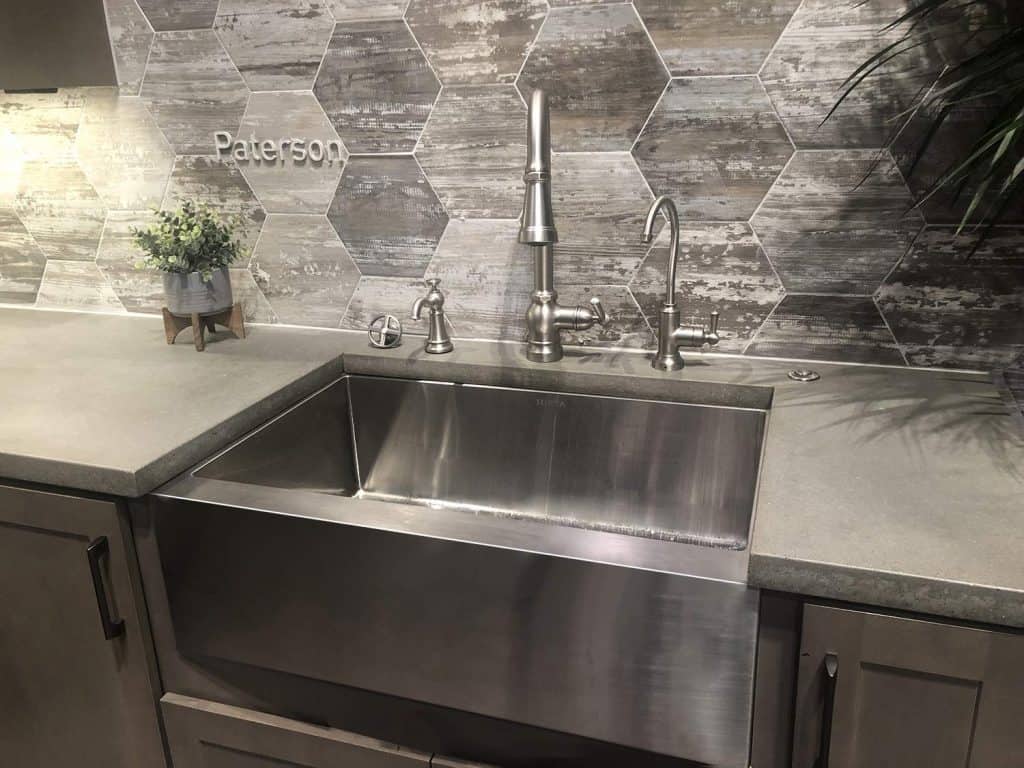
Just Manufacturing explains why stainless steel farmhouse sink is perfect for your kitchen. They say stainless steel sink is the preferred choice for being hygienic and easy to clean. Additionally, bacteria do not cling on or thrive on stainless steel. Moreover, if you clean, maintain, and protect your sink, a stainless sink prevents mold development.
In addition, stainless steel sinks are the easiest to clean. They are even non-corrosive -saving the trouble to remove rust stains. Plus, stains and scuffs can be easily eliminated using everyday cleaning methods. The only setback stainless steel has is -dents.
Both vinegar and club soda work best on stainless steel farmhouse sinks.
While using vinegar,
- Take white distilled or apple cider vinegar.
- After doing your dishes, use a vinegar solution.
- Rinse the sink using vinegar to prevent hard water stains from settling onto the surface.
- Then, rinse the sink with plain water and wipe dry.
- Do it once every week, and you’ll never have water deposits on your beautiful.
Tip -Apply mineral or olive oil all over the sink using a microfiber cloth to keep your stainless steel farmhouse sink clean and shiny.
Copper Farmhouse Sinks

Copper farmhouse sinks are becoming popular by the day. People love a classic yet aesthetic look and want functionality -copper farmhouse sinks are a perfect choice. In addition, copper is also known for offering anti-bacterial properties and is hygienic.
Try to clean your copper farmhouse sinks regularly to avoid the dirt settling into the surface.
To clean a using dish soap,
- Clean the sink and get rid of the dirt and debris.
- Add liquid dishwashing soap to a soft cloth or sponge and scrub the sink thoroughly.
- Rinse the sink using water(warm) and dry it using a lint-free cloth.
You might sometimes see green residues on your copper sinks known as verdigris.
To clean these using baking soda,
- Add baking soda onto your sponge and scrub.
- Lastly, use a lint-free cloth to dry the sink.
Caution -Never use abrasive cleansers, harsh chemicals (bleach), steel wool, rough scrubbing pads on copper.
Problem-Specific Cleaning Methods for Farmhouse Sinks
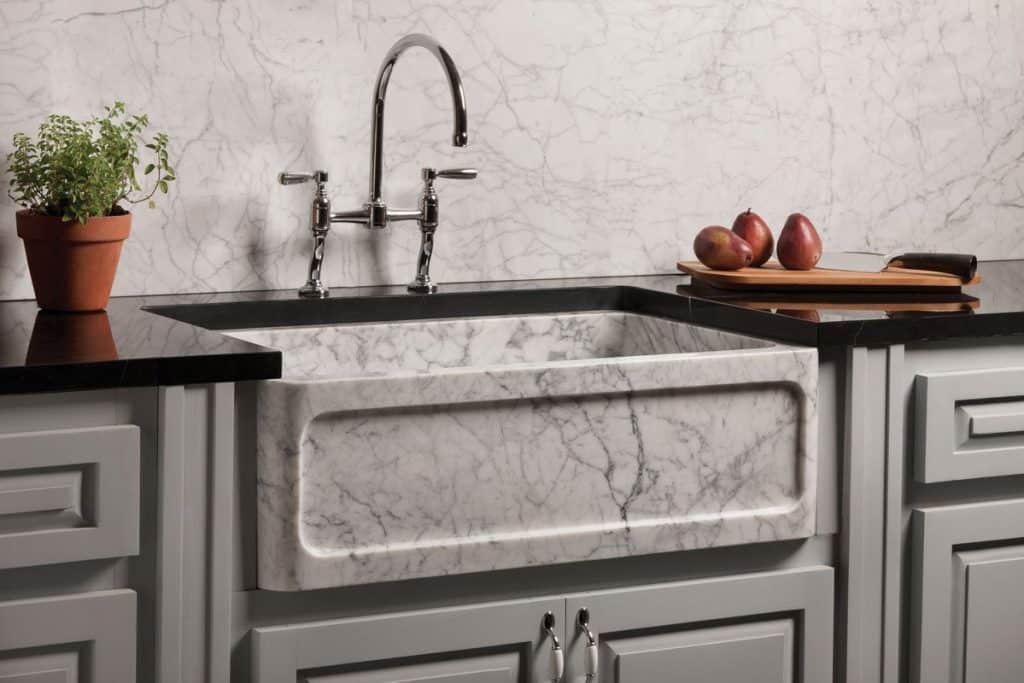
Now, we have looked at cleaning methods for specific materials. So, let us understand other cleaning methods (homemade and commercial products) that are safe to use on farmhouse sinks.
Tip –Use mild dish soap with water to clean your farmhouse kitchen sinks regularly and keep it shiny forever.
For Stains
The following methods will eliminate food stains, liquid stains, or others and clean the sink.
Vinegar
Vinegar helps remove limescale from your farmhouse sinks.
In this method,
- Fill a spray bottle with vinegar. If you don’t want to use undiluted vinegar on your sink, add some water to dilute the solution.
- Spray the vinegar all over the sink.
- Buff the sink using a soft sponge until you remove the limescale.
- Once done, rinse and dry the sink.
Hydrogen Peroxide
A readily available item is hydrogen peroxide. It helps in cleaning and whitening your sinks.
Similar to the vinegar method,
- Pour hydrogen peroxide into a spray bottle.
- On the other side, place paper towels covering the entire sink.
- Spray and soak the paper towels with hydrogen peroxide.
- Allow it to rest overnight.
- Take the paper towels out the next morning and rinse the sink with water.
- Dry the sink.
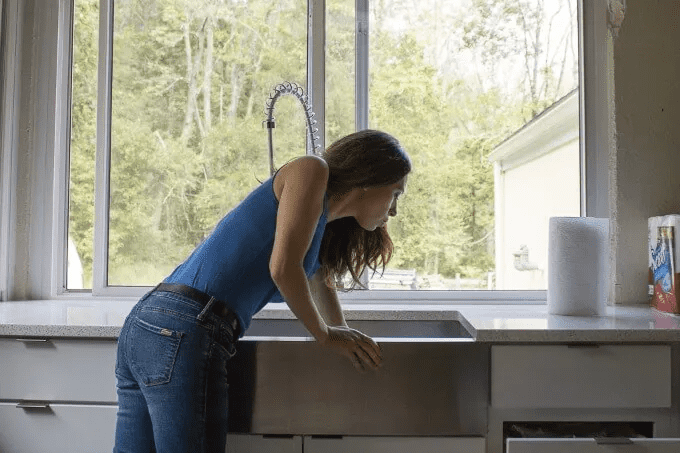
Chlorine Bleach
While using bleach, wear gloves, goggles, and a dust mask. Make sure the room is well-ventilated before spraying the bleach. Use chlorine bleach only on white porcelain farmhouse sinks. Plus, it should be left standing on the sink surface for a long time.
- Fill a spray bottle with a tablespoon of chlorine bleach and water to dilute it.
- Spray the solution thoroughly onto the sink surface.
- Let it rest for some time.
- Wash it off and dry the sink.
Caution –Do not use chlorine bleach on metallic surfaces (stainless steel) or colored sinks.
Oxygen Bleach
For stubborn stains, you need a proactive agent like the oxygen bleach.
In this method,
- Pour oxygen bleach onto 2-3 rags and soak it thoroughly.
- Start by placing these soaked rags over the stained areas in the sink.
- Let it sit on the stains for about 15-20 minutes.
- Now, remove the rags and gently scrub the stubborn stains with a soft-bristled brush.
- Repeat the process if necessary.
- In the end, rinse the sink and wipe dry.
Note -Choose oxygen bleach over chlorine bleach because it does not damage the metal surfaces and is milder than chlorine bleach.
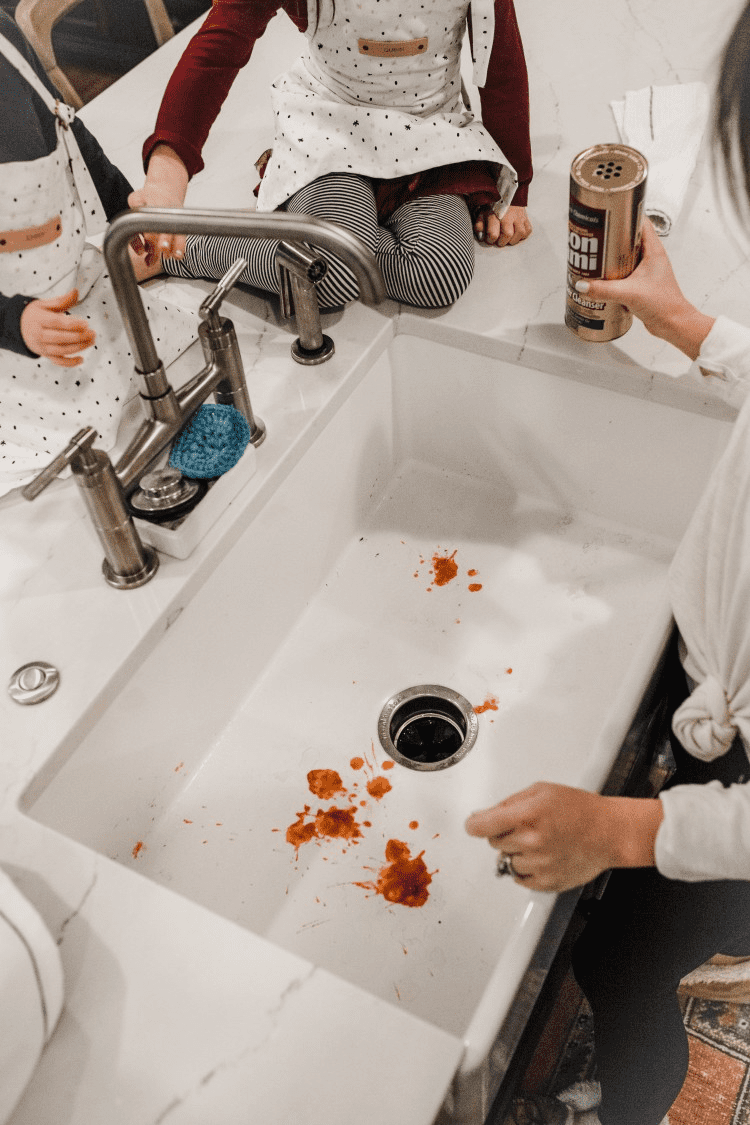
Lemon Juice and Salt
One of the easiest methods is using salt and lemon to remove stubborn stains. They are also effective in eliminating yellow stains from your farmhouse sinks.
- Either, you can drizzle table salt on the stained portion and then squeeze lemon juice over it.
- Or cut the lemon in equal halves and apply salt onto the half.
- Then, start buffing the stain with salt and lemon until the stains are gone.
- Quickly rinse the sink with plain water and wipe dry.
Baking Soda and Hydrogen Peroxide
Baking soda with hydrogen peroxide helps remove stubborn stains from the farmhouse sinks.
For this method,
- Form a paste with baking soda, hydrogen peroxide, and little water.
- Apply this paste onto a scouring pad.
- Using this pad, gently rub the stains until they are gone.
- Rinse the sink with clear water and wipe dry with a microfiber cloth.
For Heavy-Duty Stains and Minor Scratches
Bar Keeper’s Friend
One of the most recommended and used commercial products is Bar Keeper’s Friend. People love this product because it is safe, effective, and saves time.
While using BKF,
- First, pour in a generous amount of liquid dishwashing soap all over the sink.
- Then, spread the BKF onto the entire sink.
- Using an anti-bacterial wipe and some water, start scrubbing the sink.
- Scrub for a minute and rinse away the solution.
- Lastly, dry the sink.
Bon Ami
Use Bon Ami powder, same as the bar keeper’s friend. Pour in liquid dish soap and Bon Ami powder. Start scrubbing using an anti-bacterial wipe and some water. Start buffing the heavy-duty stains and after a minute, rinse the sink.
For Minor Scratches and Cracks
Repair kits are effective in eliminating minor scratches and cracks. Repair kits help you fill the cracks/scratches and restore the shine of your farmhouse sinks.
How to Prevent Your Farmhouse Sinks from Getting Damaged?
Even though there are ways to clean the stains from farmhouse sinks, isn’t it a lot better to just prevent them?
There are tips and tricks which prevent your farmhouse sinks from getting damaged.
- Install a sink grid to avoid scratches and metal scuffs.
- Clean the sink regularly to remove dirt and debris.
- Consider deep cleaning your farmhouse kitchen sink once a month.
- Try to get rid of hard water deposits, limescale as soon as you witness them.
Apply mineral/olive oil to protect your farmhouse sinks.
![Granite Vs. Marble Vs. Quartz Countertops [12 Differences+Pros & Cons] Granite Vs. Marble Vs. Quartz Countertops [12 Differences+Pros & Cons]](https://houseadorable.com/wp-content/uploads/2022/03/quartz-marble.jpg)

![What Are Kitchen Sinks Made Of ? [13 Types+Pros & Cons] What Are Kitchen Sinks Made Of ? [13 Types+Pros & Cons]](https://houseadorable.com/wp-content/uploads/2022/01/Sink-MAterial.jpg)


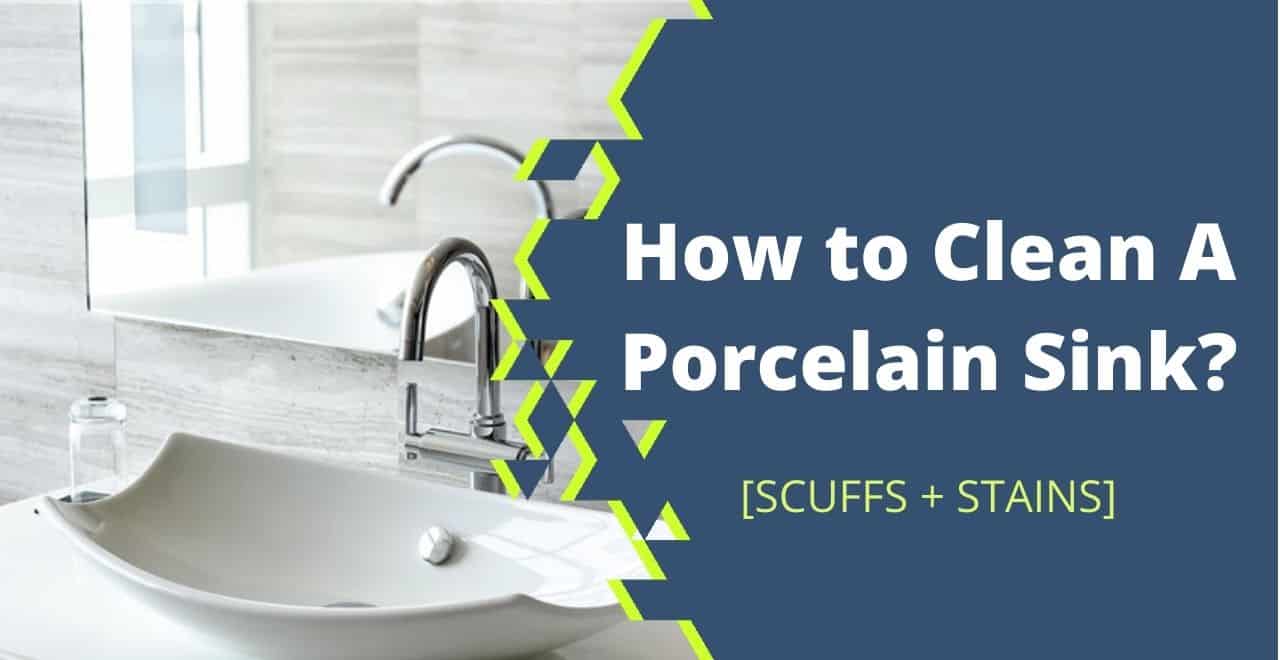
![Fireclay Vs Stainless Steel Sinks[7 Key Differences+Pros & Cons] Fireclay Vs Stainless Steel Sinks[7 Key Differences+Pros & Cons]](https://houseadorable.com/wp-content/uploads/2022/01/Fireclay-sink-3.jpg)
![Ceramic vs Stainless Steel Sink [A Detailed Analysis] Ceramic vs Stainless Steel Sink [A Detailed Analysis]](https://houseadorable.com/wp-content/uploads/2021/12/Ceramic-vs-ss.jpg)